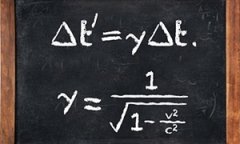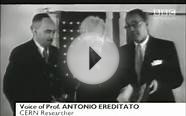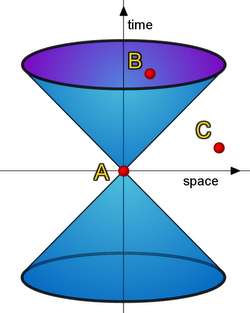Traveling at the speed of Light
 Einstein's theory of special relativity. Photograph: Observer
Einstein's theory of special relativity. Photograph: Observer
Albert Einstein is famous for many things, not least his theories of relativity. The first, the special theory of relativity, was the one that began the physicist's reputation for tearing apart the classical worldview that had come before. Special relativity, a way of relating the motion of objects in the universe, led scientists to re-evaluate their assumptions about things as fundamental as time and space. And it led to important revelations about the relationship between energy and matter.
Special relativity was published by Einstein in 1905, in a paper titled "On the Electrodynamics of Moving Bodies". He came to it after picking on a conflict he noticed between the equations for electricity and magnetism, which the physicist James Clerk Maxwell had recently developed, and Isaac Newton's more established laws of motion.
Light, according to Maxwell, was a vibration in the electromagnetic field and it travelled at a constant speed in a vacuum. More than 100 years earlier, Newton had set down his laws of motion and, together with ideas from Galileo Galilei, these showed how the speed of an object would differ depend on who was measuring it and how they were moving relative to the object. A ball you are holding will seem still to you, even when you're in a moving car. But that ball will seem to be moving to anyone standing on the pavement.
But there was a problem in applying Newton's laws of motion to light. In Maxwell's equations, the speed of electromagnetic waves is a constant defined by the properties of the material through which the waves move. There is nothing in there that allows the speed of these waves to be different for different people depending on how they were moving relative to each other. Which is bizarre, if you think about it.
See also:






|
A Decade of Discovery[ 2008 ] U. S. Department of Energy (Front cover: hundreds of particle tracks streaming from a collision of gold ions traveling near the speed of light in the STAR detector at Brookhaven Lab's Relativistic Heavy Ion Collider (RHIC)) Book (Altio Media) |




 The speed of light in vacuum, usually denoted by c, is a universal physical constant important in many areas of physics. Its value is 299,792,458 metres per second, a figure that is exact since the length of the metre is defined from this constant and the international standard for time. In imperial units this speed is approximately 186,282...
The speed of light in vacuum, usually denoted by c, is a universal physical constant important in many areas of physics. Its value is 299,792,458 metres per second, a figure that is exact since the length of the metre is defined from this constant and the international standard for time. In imperial units this speed is approximately 186,282...